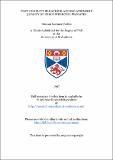Post-conflict behaviour and relationship quality of cercopithecine primates
Abstract
This thesis investigates the nature of post-conflict behaviour and relationships among individuals in two captive groups of pigtail macaques, Macaca nemestrina, and one wild troop of olive baboons, Papio anubis. Data were collected during periods of seven and twelve months respectively. In both pigtail groups, conflicts were more frequently reconciled between opponents with strong affiliative ties. However, reconciliation was twice as common in the well-established group where individuals' social networks were more compact. It is argued that the more intense ties produced by restricted networks increased the likelihood of reconciliation. Reconciliation was demonstrated among wild olive baboons, occurring at a rate consistent with a relatively intolerant dominance style. Opponents who were close kin or of similar rank reconciled relatively frequently, but reconciliation rarely followed conflicts associated with food. Olive baboons did not 'console' each other, consistent with the hypothesis that consolation requires an ability to empathise with victim distress. Initiation of post-conflict attacks on third parties was not elevated in victims of aggression. Among the baboons, both victims and initiators of aggression exhibited elevated rates of post-conflict self-directed behaviour (a combined measure of scratching, autogrooming, body-shaking and yawning). Reconciliation reduced both SDB and the incidence of further aggression. However, reconciliation only reduced SDB among individuals involved in conflicts in which they had both received and delivered aggression. Female baboons showed significantly higher rates of SDB when their nearest neighbour (within 5 m) was a dominant conspecific than when he or she was a subordinate individual, supporting the hypothesis that SDB indexes stress in primates. This result suggests that SDB can be used to index relationship security in primates.
Type
Thesis, PhD Doctor of Philosophy
Collections
Items in the St Andrews Research Repository are protected by copyright, with all rights reserved, unless otherwise indicated.

